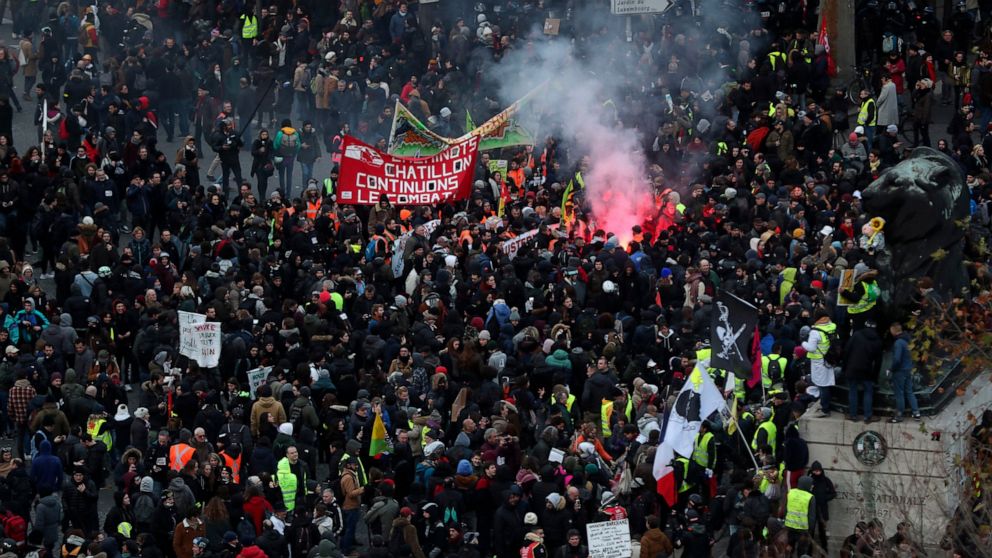Violence at work
Violence at work Thousands of people have marched through French cities as unions cranked up pressure against the government’s retirement reforms. Paris deployed thousands of police to prevent violence but the main march ended peacefully
By
ANGELA CHARLTON and NADINE ACHOUI-LESAGE
December 10, 2019, 8:15 PM
5 min read
PARIS —
Cranking up the pressure on President Emmanuel Macron, thousands of union activists marched through French cities on Tuesday and airport employees and teachers joined nationwide strikes to demand that the government scrap changes to the national retirement system.
As a crippling transportation strike hit a sixth straight day, commuters and tourists alike used used apps, shared bikes and creativity to find ways to get to work, school and museums in Paris.
Many French commuters still expressed support for the strikes, fearing that their own pensions will shrink under Macron’s new plan. But some admitted their patience is wearing thin with the transportation woes — and with train workers who are striking to keep their right to retire years earlier than others.
About half as many protesters and striking workers showed up Tuesday compared to last Thursday, when the strike kicked off and brought more than 800,000 people to the streets of France, according to the Interior Ministry cited by the French press.That could weaken the unions’ efforts to demand attention as the government prepares to unveil details of the new retirement plan Wednesday.
Unions fear the new system — which replaces a national pension system whose roots stretch back to the 17th century — will force people to work longer for smaller pensions, even though the government says it won’t raise the official retirement age of 62.
Though demonstrators were less numerous, strike action was expected to maintain its crippling strength Wednesday with little improvement in sight.
Under a sea of red flags, thousands of activists and workers from across the economy, young and old, marched on Tuesday from the gold-domed Invalides monument past the Montparnasse neighborhood in southern Paris.
Police vans and rows of helmeted riot officers flanked the march, searched nearly 2,000 people, and detained30, police headquarters said. Paris ordered shops and restaurants closed along the march route as a precaution, but Tuesday’s march ended peacefully.
Demonstrations were also held in other French cities, from Marseille on the Mediterranean to Bordeaux, Lyon and Lille.
Nationwide, only about a fifth of French trains ran normally Tuesday, frustrating tourists who found train stations empty and trains canceled. Most Paris subways were at a halt, and just one in three buses were running normally. The Paris region also saw significant traffic jams.
Some commuters used ride-sharing apps or stayed with friends and family near their offices. Others dusted off old bicycles, tested electric scooters for the first time or walked several miles to avoid sitting in traffic-choked intersections.
“Usually it takes me 1 hour and 10 minutes (to get to work), but today I left home at 8 a.m. and it’s already 10 a.m. and I’m still not at work yet,” said commuter Nabil Nouali, disembarking from a tram on the edge of Paris.
“I understand the situation, (retirement reform) concerns us all,” he told The Associated Press. “But at the same time, it penalizes all the people who have to go to work and don’t have a car.”
Air France, the national carrier, said more than 25% of its domestic traffic was grounded Tuesday by the strike, along with more than 10% of its medium-range flights, on the orders of the French civil aviation authority.
About half of Paris schools were closed and others had many classes canceled.
Some hospital workers also went on strike, though public hospitals requisition workers during strikes to ensure essential medical care.
Patients waiting for care at the Hôtel Dieu hospital in central Paris on Tuesday mostly struggled with the inordinate amount of time it took to get to the hospital on public transport. One 37-year-old woman from Persan-Beaumont in the Paris suburbs had to arrive 5 hours early for her blood analysis appointment because of the few trains running.
The strikes are a big test for Macron, who promised to reform France’s retirement system while campaigning for president in 2017. He has ordered up two years of consultations with workers and employers about the new system, which aims to blend 42 separate retirement plans into one.
Macron argues the reforms are needed to keep the pension system from sinking into billions of euros of debt as life spans lengthen and to make the system fairer to all workers, not just those in certain professions.
Unions, however, fear the pension changes are part of a broader mission to dismantle worker protections.
———
Thomas Adamson in Paris contributed to this report.
